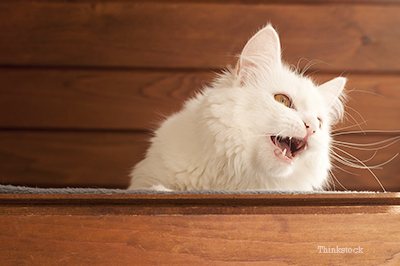Talking to our cats is often a normal part of our relationship with them. We chat away while not really expecting that they understand our complex sentences or even some of our succinct commands. Yet when they ‘talk’ to us, we are often frustrated by our inability to interpret their meaning or intention. This is especially true with our feline friends.
Why is your cat talking to you? Is she upset or not? What does she want or need? Cats do talk
Cats do talk
Firstly, your cat may be perfectly fine. This is most often the case. Individual cats have their own unique personalities. Some are chatty and some are not. There are even certain breeds (like Siamese cats) that tend, by nature, to be more vocal. Certainly there are times when it’s absolutely normal for a cat to be more vocal (like when there are other strange cats in the vicinity or during breeding season) — especially if your cat has not been spayed or neutered.
You know your cat better than anyone. That makes you the best authority on what is normal and also puts you in the best position to notice any increase in your cat’s vocalization patterns or habits. If your cat is talking more, what are the possible reasons for that change?
Could my talking cat be trying to tell me something is wrong?
Pain or discomfort can certainly make your cat cry out – whether it’s due to hunger or thirst, injury or arthritis, or even weakness. Your cat may be crying or talking more in order to put a voice to her physical distress. If you think your cat’s vocalizations may indicate a physical problem, consult your veterinarian to explore those possibilities.
My cat’s a senior. Could she be “senile?”
As is the case with humans, altered perception can result in increased vocalization. This tends to be especially true of older cats and often times is more apparent (or just more bothersome) at night. Just like us, as our cats age, they can experience diminished vision or hearing and may even develop cognitive dysfunction or senility. There are medications that may help with confusion and senility.
If your cat cannot see, hear or even smell or simply becomes confused by her surroundings, she may cry out. Some owners might not immediately recognize impending hearing or vision loss in a cat; fortunately, routine testing could reveal these types of problems and some causes of diminished sight can be treated (like cataracts). Absolutely mention these concerns when you take your cat in for her checkups. You might also consider keeping your cat closer to you at night, leaving nightlights on and maybe even playing music.
What other medical conditions would cause cats to talk more?
Other physiological disorders that can cause increased crying and meowing in cats include:
- Diabetes
- Hypertension
- Hyperthyroidism1
If your cat’s vocalization seems to be increasing it should be checked out. Consultation with your veterinarian and/or a veterinary behaviorist is recommended to determine if medical or behavioral problems exist so that they can be effectively addressed.
Return to, "6 Strange Cat Behaviors Finally Explained" >>
1.Hyperthyroidism in Cats. UCDavis Veterinary Medicine. UC<http://www.vetmed.ucdavis.edu/vmth/small_animal/internal_medicine/newsle...
If you have any questions or concerns, you should always visit or call your veterinarian -- they are your best resource to ensure the health and well-being of your pets.
